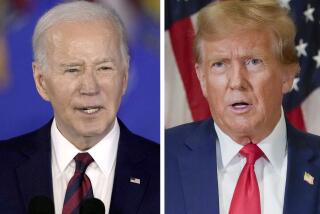Trump has gotten even less popular while in office
President Trump had a brief increase in popularity early in his transition, but has lost significant ground in polls since his inauguration.
Reporting from Washington — One of the enduring myths of President Trump’s political career is the belief that “nothing matters” — that the controversies that surround him have no effect on his standing with the public.
The three weeks since Trump’s inauguration have once again proven that untrue: Trump has lost significant ground in public approval in the aftermath of a rough start.
Without question, Trump, who won the presidency with a minority of the votes cast, has retained a strong hold on his core supporters, whose loyalty remains ardent. Republicans are more approving of his personal qualities than they were in the fall, according to several ratings. And Trump has plenty of time to turn around the current negative trend in his overall ratings.
But the pattern is consistent: After a brief increase in popularity early in his transition, almost all public polls show a decline in Trump’s support, though the exact amount varies.
In Gallup’s surveys, Trump’s job approval has gone from an even split the week of his inauguration, with 45% of Americans approving and 45% disapproving, to a 10-point deficit in the latest average, 42% to 52%.
Gallup has tracked every American president since Franklin D. Roosevelt, and before Trump, none hit 50% disapproval for months, sometimes years. Trump has fallen below all but the lowest points for President Obama and into territory plumbed by Harry Truman, Richard Nixon and Jimmy Carter.
Asked about specific qualities of leadership, Americans in Gallup’s surveys give Trump strong marks for keeping his promises and being a “strong and decisive” leader. But majorities rate him negatively on inspiring confidence, managing the government effectively and being honest.
On each of those measures, a vast gulf separates the mostly positive views of Republicans from the negative views of most Democrats.
In addition to Gallup, other polls showing a decline in Trump’s job approval include a GOP favorite, Rasmussen, which has shown Trump dropping from a 14-point net approval rating when he started to four points now; YouGov, which has found a 13-point decline; and Quinnipiac, with a 17-point drop.
Among major nonpartisan surveys, the only one to depart from the pattern is the Reuters/Ipsos poll, which had Trump’s approval at a two-point deficit when he started and now has him barely in positive territory, with 48% approving and 47% disapproving.
For now, what matters most to Trump is holding the support of his core voters. That’s key to his strength in Congress, especially in the House, because his popularity remains high in most Republican-held congressional districts.
But if his decline persists, it could weaken Trump’s sway in the Senate, where members need to run statewide.
Whether Trump’s approval rating will drop further depends largely on independents and Republicans — he has almost no support to lose among Democrats. If those voters do sour on him, that could pose a threat to Republicans in the midterm election in 2018. The incumbent president’s approval rating historically serves as a good predictor of how many seats his party will lose at midterm.
Most presidents lose ground during their first two years. The average decline since World War II is just short of eight points, according to a compilation by Marquette University political scientist Charles Franklin. If Trump follows that pattern, he could end up with an approval rating in the high 30s — perilous territory for congressional candidates running in swing districts.
More to Read
Sign up for Essential California
The most important California stories and recommendations in your inbox every morning.
You may occasionally receive promotional content from the Los Angeles Times.











